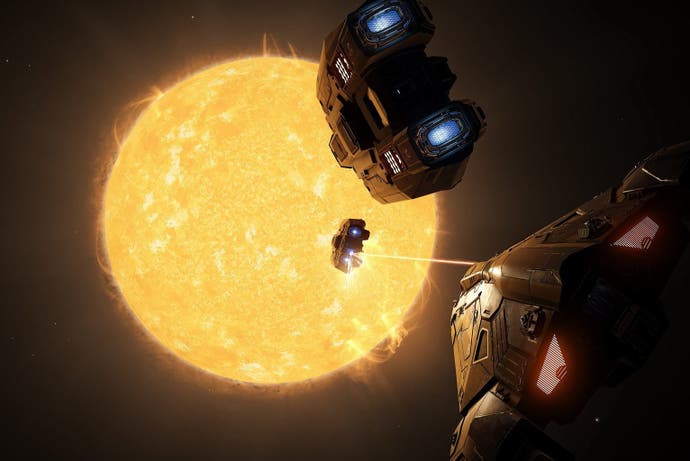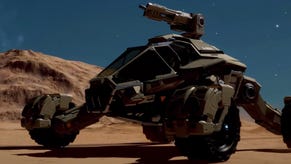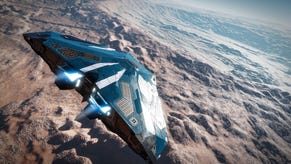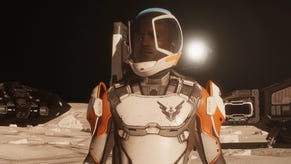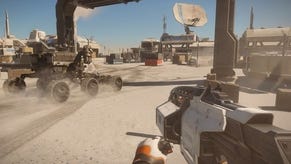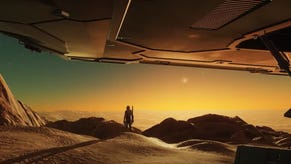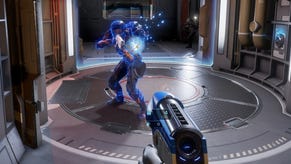Elite: Dangerous: the David Braben interview
On consoles, Steam, Oculus Rift and massive spaceships.
At EGX yesterday Frontier boss David Braben delivered a developer session on Elite: Dangerous, the space game currently in beta and due out before the end of 2014. In it he talked passionately about spaceships, player politics and a virtual galaxy packed with billions of stars.
This morning I sat down with Braben - in the relative peace and quiet of the calm before the EGX storm - to follow up on a few of his points. He reckons gaming has gone stale, so will Elite: Dangerous have the same effect as the original, released a sobering 30 years ago, and freshen things up? And what about those console versions? And pesky publishers - surely a few have been in touch, right? And what's the vision for Oculus Rift support?
Oh, and of course I put a few of your questions (thank you dear Eurogamer readers, you're the best) to the man in the hotseat. Want to know what the biggest ship in Elite: Dangerous will be? Strap yourself in - it's time for forward thrust.
Based on your developer session, I get a sense you're motivated by a feeling that gaming has gone stale. Was that the main reason you wanted to return to Elite, or is there more to it than that?
David Braben: I'd wanted to go back to Elite for a long time, and I wanted to be able to do it properly. I suppose, with first-person shooters, they're beautifully executed games, they're just all very similar, very samey, they're not breaking new ground. Our kids weren't that bothered by the new Call of Duty. They said they'd rather have something different. I felt the same. I felt with the previous one, does this really add a lot?
Is there evidence of a trend, though? Are you responding to this perception that gaming has gone stale on your own? Or is there a movement happening?
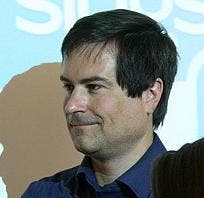
David Braben: To a small extent we've helped blaze a trail, but we're not the only ones. What's happened now, ironically, publishers have looked and thought, oh, maybe these games are quite popular. Maybe we should do something different. Which is great.
Way back in the 80s, Elite showed that, actually, they don't have to be arcade game clones to do well. That was the staleness that happened in the 80s. And suddenly we saw a burgeoning of new genres, and that was brilliant. I'm not saying that was solely Elite, but there was a mindset change when Elite was solidly number one in the charts for a long time. Publishers can't help but notice that.
Do you envisage Elite: Dangerous and Star Citizen causing a similar mindset change, or will it be a more of a modest change this time around?
David Braben: I hope so. But part of the mindset change has come because of the democratisation through iOS. We've seen a lot of indie games - a term I find kind irritating now. Really what it means is smaller dev budget games trying out interesting ideas. That's great, because it's already bringing a lot of new blood in and a lot of new ideas, and it's forcing the older, publisher-based outlook to change as well, and to freshen it up. That is positive.
You talk about publishers perhaps taking notice of Elite and games of its kind now they've gone through the crowdfunding system and have an audience. Have any been in touch with you about picking up the game?
David Braben: Don't forget we talk to publishers all the time. We're doing Screamride. We've got other games coming with another publisher, which we haven't announced yet. Obviously we talk about it. They're not blind to it. But I can't say any details.
The real point is, it's an exciting time for the industry, and for publishers as well I suppose. We've got the new consoles coming through. We've got the resurgence of the PC, which is a great thing. As we see those changes, we see new types of game being enabled by it, and new approaches to games.
Could you imagine a publisher publishing Papers, Please? It's a very different take. Look at something like Minecraft. That's a complete antithesis to a publisher game, when it first started - blocky and what was called at the time retro, but actually innovative in the way it puts things together. And look now. Coming late to the party sounds like it's very expensive.
I wonder whether big publishers will create their own space games, now Elite and Star Citizen are doing well.
David Braben: We've got a good lead here, and we're not going to stop. We're going to keep adding things, making it richer, building a wonderful community.
And by self-publishing Elite you're in control of your own destiny. Any money made by the game is yours to do with as you see fit. You're not beholden to a publisher who might stick its oar in development.
David Braben: That's right. Right from the start we planned to support head-mounted displays, but I didn't expect to do it until a lot later. I fancied it, because I thought, oh, that's cool. I wonder what it looks like on that. And so many of our team thought that. We talked with the backers, who also said, this has to be on Oculus Rift. DK1 was just out for developers then. It was still a bit niche at that time.
I said, look, I'd really like to do this. How long will it take? The team said, oh, three days. I said, let's give it a go. Then we released it at Christmas. Now, with a publisher, we would have had a conversation: we'd like to add this support. We would go through a whole, well, how many people have it? We need to see the results. Actually, you end up spending more time on that than implementing the thing. So we just said, right, let's do it. And the response has been amazing.
Looking at our stats in December 2013, nearly 10 per cent of the backers were playing with Oculus Rift.
Is it more now?
David Braben: It's more people, but probably a lower percentage. Don't forget, the alpha backers have already paid quite a lot for the game - and that you very much to all of them! So it's a self-selecting group who are much less price selective. As we moved to premium beta and then beta, and the price came down, we saw a lower percentage.
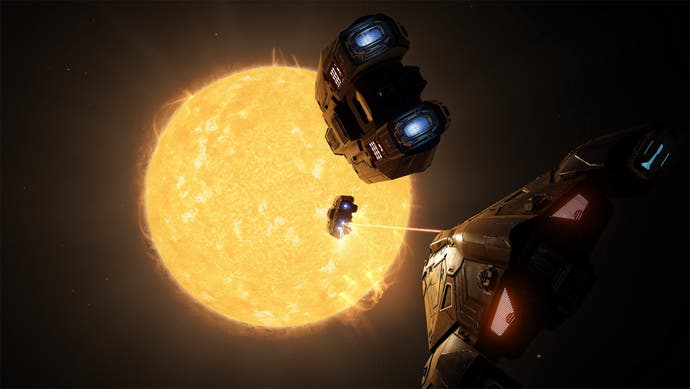
I've got some reader questions. One asks, you've talked about PC and Mac. What about Linux?
David Braben: I'm a big fan of Linux. We want to get the PC version right. We're not being distracted yet. And we will look at other platforms once we've got this. Obviously there are a lot of other possible platforms we can support, including Linux and console. Depending on console choices, Linux may be easier or harder as well. So we want to try and do a proper, sensible roadmap than a kneejerk. It would be easy for me to say, oh yes, we'll do that. I want to do that, but I can't say we're doing that on this date. We need to plan it sensibly. And so we will.
With Raspberry Pi we chose Linux. I am aware there are a lot of big Linux communities. But we've got to be sensible about it.
Are you any closer to deciding whether you're doing a console version?
David Braben: We are, because we're getting closer to release. We've said we will make a decision, but we don't want to get sidetracked. We don't want to get distracted. Obviously it is something we're seriously internally looking at.
Have Sony and Microsoft been in touch?
David Braben: We're doing a first-party game with Microsoft. We talk about all sorts of things. And obviously we talk to Sony as well. But I'm not saying anything about it.
Another reader question: what's the largest type of ship you're planning on introducing into the game?
David Braben: Initially there will be non-playable ships, like the big cruisers. We've seen a Federal cruiser already - the Impeccable you defend and Damocles in the video we originally released. There's also an Imperial cruiser, which you've probably also seen in the videos. Those are the biggest ships. But there are also the Ocellus stations, which move around very slowly. They're sort of ships. And giant freighters based on those. The biggest ship in the game is going to be the Panther Clipper.
Will there be an option for multiplayer when it comes to the ships? For example, a pilot with a couple of gunners.
David Braben: That is something I want us to do. It's on the roadmap for after release. It's not for release. As a lot of people have noticed, ships like the Cobra has two seats. Type-9 has three seats. The Anaconda has three seats. That's exactly what they're for.
Another reader question: have any games released in the past few years changed your original ideas for Elite: Dangerous? FTL, perhaps. Or have you stayed true to the original vision you had all those years ago?
David Braben: We've stayed pretty true to the original vision. A lot of the changes are enabled by underlying changes in technology, particularly online. Performance has enabled a lot of beauty on the screen. The game design is a lot richer than it's ever been, building on where we were with Frontier and First Encounters.
This whole infrastructure for having stories roll out - I'll give you an exclusive tip: it looks like Eranin is going to war with the rebels. Civil war is starting today. That is unfolding. It's very interesting looking at the social side of it. When we had the leader of the government of Eranin addressing people as comrades, it's amazing to see how many players then started siding with the rebels and the Federation, particularly in America.
Anyway, the balance has been tipped, so the rebels are on the ascendancy.
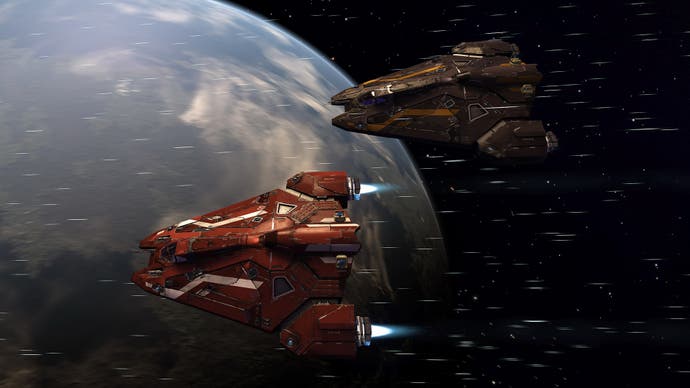
What's your take on the latest version of Oculus Rift and how you might use it in the game?
David Braben: Oculus Rift keeps getting better. It's a really good experience. We're showing DK2 here. My personal feeling is, it's fantastic, but I would like more resolution. I would like 4K.
I'm not sure they'll hit that for the consumer version.
David Braben: They will one day. In the same way we're supporting 4K and 8K, it will come. That's when it will properly arrive. Don't get me wrong, at the moment it's a fantastic experience. And DK2 is great. The improvements they're doing with the new one are all fantastic. They're all towards that goal.
You've committed to a 2014 release. Are you 100 per cent sure Elite: Dangerous is coming out in 2014?
David Braben: Yep. It's exciting. The more we do the more we realise there is to do. We don't stop at release. We will keep adding to it and improving. There's so much richness to come. There is so much there today - particularly when people see beta 2 - how much gameplay there is there. The game is already playable from start to finish. We're just making it richer and richer. It's exciting. That's why I'm confident.
Will you launch the game on Steam?
David Braben: No. We've got to support the game with our own back end anyway, so I don't see the benefit of it.
Well, I would suggest the benefit is 100m users, which is a huge potential audience.
David Braben: Yes, that's true. It's something we would look at, but it would have to then interface with what we're doing, and the two would potentially conflict. We have to provide the back end.
Thank you for your time.
